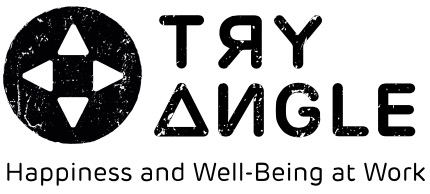Our lives are made up of a combination of things that happen to us and the choices we make. Once you realize that, our experience can become more peaceful. At least for many, but unfortunately not for everyone. For some, this discovery triggers resistance. Perhaps because this approach limits the opportunity for a drama triangle to unfold: it is no longer about “poor me, look what happened to me – I am a victim of the situation“, but it’s more about resilience and mindset. Understanding that events are what they are and that no label or adjective needs to be attributed, but that we just like to do it, changes whole the mental model.
Mental models
In 2009, American professor of business administration Srikumar Rao already spoke about the importance of mental models at the Happiness at Work conference, an annual event organized by Woohoo Inc. Every person looks at the world through their own lens, characterized by our frame of reference. They form the crossroads of our upbringing, values, norms, preferences, experiences, insights and mental models show us the route to take. It is according to these models that our reality is shaped, how we structure it and how we find something to hold on to. This means that people can have different reactions to the same events.
How people think
Albert Ellis, who has a PhD in psychology, introduced RET: Rational Emotive Therapy in 1955. RET is a form of psychotherapy that addresses the emotional and behavioral aspects of problems by focusing on how people think. RET reminds people that you are in control of your own emotional destiny by dealing with them in a healthy or rational way, or thinking unhealthily or irrationally.
RET has an ABC system (Activating events, Beliefs, emotional and behavioral Consequences), that has been translated into other models (such as the 5G model in Dutch: Gebeurtenis – Gedachten – Gevoel – Gedrag – Gevolg):
- What happened: What was the situation like? What transpired?
- What did you think: What thoughts did you get because of that situation?
- How did you feel: What emotions and feelings occurred?
- What did you do: What behavior did you have? What went well? What didn’t?
- What was the end result: What was the effect of your behavior? What will you do differently next time? What will you keep on doing?
Undergo unconsciously or choose consciously?
We learned that events trigger thoughts, which in turn trigger feelings that cause us to behave in a certain way, that have certain consequences. You can go through this chain of events in an unconscious manner, often entailing behavior that leads to negative consequences, but you can also go through the process more consciously, hence allowing you to choose your behavior.
The statement that you are able to choose your behavior perhaps warrents a bit more explanation. After all, we all have lived through events and circumstances that stress us out and this may cause us to react in ways that, in retrospect, make us think: “Hm, I could have handled that better“. When stress is at play, our quick-thinking reptilian brain is in in the driver’s seat. That part of our brain makes us react more instinctively – using our reflexes and automatic behaviors. It works super fast and reacts instantaneously.
Hence, it’s not easy (or more biologically impossible) to analyse your options with your reptilian brain at the steering wheel. The trick is to slow down. Hold off on your spontaneous reaction for just a moment, and let your rational brain take a shot at the abovementoned step-by-step approach. This way, you are able to choose more consciously whether to let your reptilian brain to react right here and now, without further reflection. But, you now also have the option take a more little distance, look beyond the current situation and perhaps react very differently than your reptilian brain would have.
Reflex or rational thinking
Everything that happens in your life offers an opportunity to react based on your automatic reflex or rather from a rational perspective. This means that, contrary to popular belief, using this insight, we are no longer just the victim of your circumstances.
How can you apply this in a practical way?
- Do you find yourself having a tough conversation? Instead of pushing through under the influence of your reptilian brain, choose to take a time-out. Let the conversation sink in and pick it up again when you feel more calm.
- Are you in a competitive situation? Slow down and take some time to review what’s going on from a broader perspective, so you can focus your attention (again) on yourself instead of on the competitor.
- Have you been disappointed and are you convinced that the whole world is against you? Take a moment to re-evaluate that conclusion and realize that you are the one using this mental model. Ask yourself if this way of thinking is helpful or if you might be better off choosing a different thought …
Make your choice
Life is a combination of events and circumstances, and it is up to us to decide how we react to it. Let’s not forget to allow some room for our emotions next to the rational aspects. After all, our emotions are valid, so are our thoughts. However, the question remains if our thoughts and emotions are the result of the actual circumstances or if they have been colored by our reptilian brain or mental models. Our reptilian brain is a great tool that helps us survive, but is also the source of limiting beliefs. To be able to live life to the fullest, to be aware of the here and now, using a positive mindset, it’s – again – up to us to decide who will be in the lead: our reptilian brain or your rational brain.
The Cactus Files
Discover more inspiration about Happiness at Work from the mind of Chief Happiness Officer Griet Deca in The Cactus Files.
Start watching the entire series, starting with episode #1 by clicking here.
Or visit this link and jump to Cactus File #16 which is linked to this blog article: “You can choose to ruin your day”






